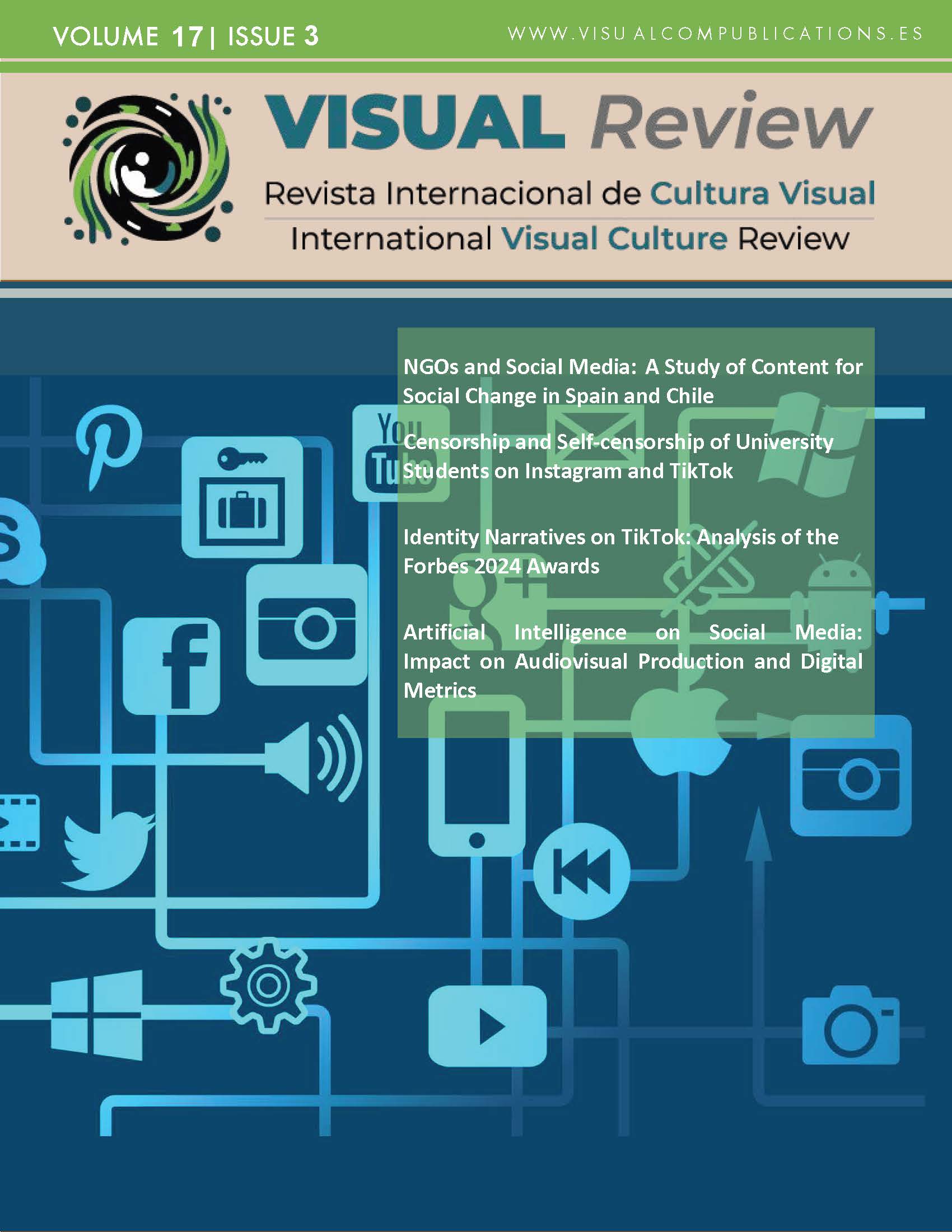Artificial Intelligence on Social Media
Impact on Audiovisual Production and Digital Metrics
DOI:
https://doi.org/10.62161/revvisual.v17.5782Keywords:
Artificial Intelligence, Social media, Audiovisual Production, Digital Content, Engagement, Social metrics, Generative AIAbstract
Artificial intelligence (AI) has revolutionized the production of audiovisual content for social media, optimizing processes and redefining communication strategies. This study examines its integration into social media departments, assessing its impact on the creation of images and videos, as well as key metrics such as engagement, reach, and conversion. Through a survey of industry professionals, the study identifies tools, selection criteria, and challenges such as bias and authenticity. The findings reveal growing adoption, although concerns persist regarding public trust and the quality of AI-generated content.
Downloads
Global Statistics ℹ️
|
1459
Views
|
1005
Downloads
|
|
2464
Total
|
|
References
AI at Wharton & GBK Collective. (2024, October). Growing up: Navigating Gen AI’s early years (Executive Summary). The Wharton School, University of Pennsylvania. https://ai.wharton.upenn.edu
Aguado, J. M., & Martínez, I. J. (2023). Inteligencia artificial y privacidad: La transformación de la publicidad digital y su impacto en el ecosistema de medios. In T. Vázquez-Barrio, & I. Salazar García (Eds.), Inteligencia artificial y privacidad la transformación de la publicidad digital y su impacto en el ecosistema de medios (pp. 339–362). Tirant Humanidades.
Bhuiya, J. (2025, January, 03). Meta is killing off its own AI-powered instagram and facebook profiles. The Guardian. https://www.theguardian.com/technology/2025/jan/03/meta-ai-powered-instagram-facebook-profiles
De Lara-González, A., Arias-Robles, F., & García-Avilés, J. A. (2022). Implantación de la inteligencia artificial en los medios españoles: Análisis de las percepciones de los profesionales. Textual & Visual Media, 1(16)https://doi.org/10.56418/txt.15.2022.00
Dell'Acqua, F., McFowland, E., Mollick, E. R., Lifshitz-Assaf, H., Kellogg, K., Rajendran, S., Krayer, L., Candelon, F., & Lakhani, K. R. (2023). Navigating the jagged technological frontier: Field experimental evidence of the effects of AI on knowledge worker productivity and quality. .10.2139/ssrn.4573321 Retrieved from CrossRef https://bit.ly/4aEUqw1
IAB Spain. (2024). Estudio anual de redes sociales 2024 de IAB Spain. https://bit.ly/4aHlieF
Foro IA. (2025). Humanidad aumentada. el impacto de la inteligencia artificial en marketing, comunicación y experiencia del cliente. Territorio Creativo S.L.
Giménez, A. (2022, October, 16). Regla del 90-9-1. La desigualdad participativa en internet. Aunitz.net. Retrieved 10.01.2025, from https://www.aunitz.net/regla-del-90-9-1
Grewal, D., Satornino, C. B., Davenport, T., & Guha, A. (2024). How generative AI is shaping the future of marketing. Journal of the Academy of Marketing Science, 10.1007/s11747-024-01064-3
Korst, J., Puntoni, S., Purk, M., Smith, B., Colón, A., & Urbina-Mccarthy, D. (2024). Growing up: Navigating gen AI's early years.Wharton University of Pensylvania: https://bit.ly/4gtRhAm
Lopezosa, C., Codina, L., Pont-Sorribes, C., & Vállez, M. (2023). Use of generative artificial intelligence in the training of journalists: Challenges, uses and training proposal. El Profesional De La Información, 10.3145/epi.2023.jul.08
Martínez Martínez, I. J., Aguado Terrón, J. M., & Sánchez Cobarro, P. (2022). Smart advertising: Innovación y disrupción tecnológica asociadas a la IA en el ecosistema publicitario. Revista Latina De Comunicación Social, 80, 69–90. https://www.doi.org/10.4185/RLCS-2022-1693
McKinsey & Company. (2024). The state of IA in early 2024: Gen AI adoption spikes and starts to generate value. https://bit.ly/42DTdTz
Noain-Sánchez, A., Rey, U., & Carlos, J. (2022). Addressing the impact of artificial intelligence on journalism: The perception of experts, journalists and academics. Communication & Society, 35(3)105-121. https://doi.org/10.15581/003.35.3.105-121
Novoa-Jaso, M. F., Sierra, A., Labiano, R., & Miguel-Vara, A. (2024). Digital news report España 2024. Pamplona: Servicio de Publicaciones de la Universidad de Navarra. https://bit.ly/3Ev2XW8
Salazar, I. (2018). Los robots y la inteligencia artificial. nuevos retos del periodismo. Doxa Comunicación. Revista Interdisciplinar De Estudios De Comunicación Y Ciencias Sociales, (27), 295. 10.31921/doxacom.n27a15
SAS, & Coleman Parkes Research. (2024). Marketers and GenAI: Diving into the shallow end. https://bit.ly/40WWNqA
Downloads
Published
How to Cite
Issue
Section
License
Copyright (c) 2025 Authors retain copyright and transfer to the journal the right of first publication and publishing rights

This work is licensed under a Creative Commons Attribution-NoDerivatives 4.0 International License.
Those authors who publish in this journal accept the following terms:
-
Authors retain copyright.
-
Authors transfer to the journal the right of first publication. The journal also owns the publishing rights.
-
All published contents are governed by an Attribution-NoDerivatives 4.0 International License.
Access the informative version and legal text of the license. By virtue of this, third parties are allowed to use what is published as long as they mention the authorship of the work and the first publication in this journal. If you transform the material, you may not distribute the modified work. -
Authors may make other independent and additional contractual arrangements for non-exclusive distribution of the version of the article published in this journal (e.g., inclusion in an institutional repository or publication in a book) as long as they clearly indicate that the work was first published in this journal.
- Authors are allowed and recommended to publish their work on the Internet (for example on institutional and personal websites), following the publication of, and referencing the journal, as this could lead to constructive exchanges and a more extensive and quick circulation of published works (see The Effect of Open Access).














